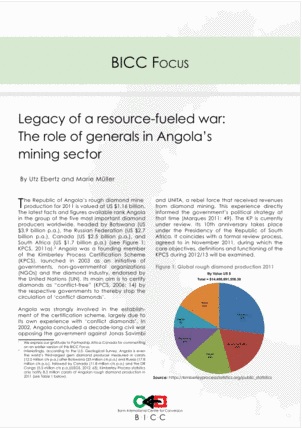Angola Refutes NGO Report on Army Role in Diamonds
June 14, 13
(IDEX Online News) –The government of Angola says it "categorically rejects" allegations of human rights abuses in the country made by the German NGO, the Bonn International Center for Conversion (BICC). 
The BICC report, Legacy of a resource-fueled war: The role of generals in Angola’s mining sector looks at the alleged role that Angolan army generals play in Angola’s mining sector.
The report says there is a business and security network connecting the MPLA government, the generals and international businesses in the Angolan diamond sector. It also alleges large-scale human rights violations in the country connected with the network of security and mining bodies.
Angola points out that since the establishment of the Kimberley Process a decade ago, it has hosted two review missions. In neither of the review mission reports was there "any fact, direct or direct, linked to violence around the artisanal diamond mining sector," its statement said.
"The last report of 2009 recommended the government of Angola for its positive contribution to the living standards of the people of the country and this following increased revenues from diamond mining activities," said the Angolan statement, distributed by Paulo Mvika of the Working Group on Artisanal and Alluvial Production, KP.
The statement also quotes the 2009 report as saying: “At present Angola’s investment climate is favorable. There is peace and freedom of movement of the country’s people, services and judicial protection of private investments and legal guarantees to protect reinvestments and repatriation of financial assets.”
The statement pointed out that UN High Commissioner for Human Rights, Navi Pillay, visited the provinces of Lunda Norte and Lunda Sul on April 24, and said a great deal of progress had been achieved in the 10 years since the end of the country's civil war in 2002, aided by its oil and diamond income. "The government has invested heavily in important infrastructure including schools, medical facilities, major housing projects, water and electricity supplies, improved prisons, and thousands of kilometers of roads. Work continues to remove the many thousands of landmines.”
Pillay also addressed the issue of the living conditions of the many illegal immigrants from DRC. “I fully accept that the irregular entry of tens of thousands of migrants into Angola every year, many of them seeking to dig illegally for diamonds, is causing major problems for the government which has a right to set limits to migration and to regulate a key industry. It also has a right to deport irregular migrants, but must do so humanely and in full compliance with international human rights laws and standards. I support efforts to tackle this extremely complex and difficult issue at a regional level, and have agreed to raise the issue of closer cooperation by the DRC, from where around 80 percent of the migrants entering Angola originate.”
Angola also said the BICC report was published during the KP Intersessional Meeting in Kimberley, South Africa, in a bid "to put pressure on reforms currently being addressed within the KPCS and about which there is strong discontent within NGOs about the speed with which progress is made.
"The government of Angola regrets that no proper enquiries were made to substantiate the unfounded allegations and that it has been used as a scapegoat to push forward a reform agenda which currently is not supported by all KP Participants."